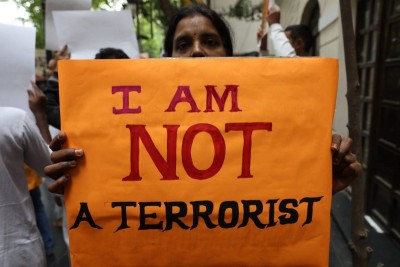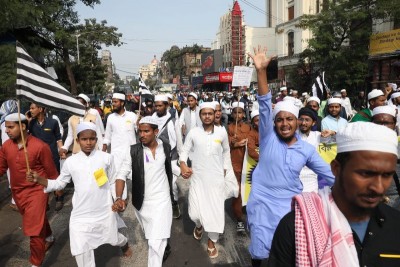
Union Home Minister chairs the meeting of Coastal States and UTs
The meeting has been convened to review the coastal security of India.
During the meeting, Rajnath Singh reviewed all aspects of security along the country's 7,516 km long coastline.
The Minister stressed upon the need to safeguard not only industrial, commercial establishments and strategic installations, but also the entire coastline from external threats through sea routes.
He said that steps have been initiated post 26/11 Mumbai terror attack, wherein Indian Coast Guard (ICG) is designated as the authority responsible for coastal security in territorial waters including areas to be patrolled by coastal police.
Indian Navy is responsible for overall maritime security including coastal security and offshore security. Indian coasts are guarded by a 3-tier system of State Marine Police, Indian Coast Guard and Indian Navy.
Rajnath Singh said that the ICG conducts coastal security exercises involving all stakeholders in all coastal states or UTs biannually to validate these Standard Operating Procedures (SOPs), prepared by the Ministry of Home Affairs (MHA) for functioning of coastal police stations and also ICG promulgates these SOPs for coordination among various agencies on coastal security issues.
The Minister said that the coastline has been further secured by the creation of chain of static sensors and Automatic Identification System (AIS) receivers along the Indian Coast and Radars operated by the ICG at 45 locations while 38 more Radars are planned to be installed for gapless surveillance of the coastline.
Rajnath Singh also said that the MHA has issued Guidelines to the coastal states/UTs in regard to security of non-major ports.
Further, he informed that for training of coastal police, in-principle approval has been accorded for setting up of National Marine Police Training Institute in Gujarat and State Marine Police Training Centres in the Police Training Academies of States and Union Territories. In order to track illegal movement, registration of fishing vessels has been made compulsory and for sensitizing fishermen on safety issues, community interaction programmes are conducted by Indian Coast Guard.
The Minister said that consequent upon implementation of these important initiatives, our coasts are far more secure now. To strengthen the monitoring and coordination mechanism for the entire gamut of coastal security, the Government has set up an institutional mechanism at the State and the District level, and has strengthened the MHA level Steering Committee at the National Level for review of coastal security, he added.
Rajnath Singh highlighted the issues of maritime terrorism and its economic implications. He also invited suggestions from the Coastal States/UTs for the Phase-III of the Coastal Security Scheme to be implemented in next five years.
The Minister said that with the active cooperation of all the State Governments & Union Territories and with the efforts of the officials of the Ministry of Home Affairs and other Ministries as well as agencies like the Indian Navy, Coast Guard and the Coastal Police, coastal security will continue to improve and our entire coastline will be fully secured from any threat from the sea.
During the meeting, the Coastal Security Scheme managed by the Government of India with an objective of strengthening the infrastructure of Coastal States or UTs for coastal patrolling and surveillance, was also discussed. Under the scheme, assistance is given to all Coastal States and Union Territories to set up coastal police stations, check posts, outposts and construction of jetties for berthing of police boats. Presently, the Phase II of this Scheme is in progress.
There were discussions on expeditious implementation of coastal security scheme, institutional set up in States or UTs to review coastal security, constitution of State Maritime Boards, security of non-major ports and single point mooring, coastal mapping, security of islands, distribution of Biometric Identity Cards and Card Readers, colour coding of boats, monitoring of fish landing points and crossing of International Maritime Boundary Line (IMBL) by fishermen.
Devendra Fadnavis, Chief Minister of Maharashtra suggested that marine policing being a specialized job, a Central Marine Police Force be created to protect sea, coast, ports and vital institutions.
He also suggested that all landing points and non major ports should be brought under tech based e-surveillance. Both these suggestions were supported by some States and UTs.
Support Our Journalism
We cannot do without you.. your contribution supports unbiased journalism
IBNS is not driven by any ism- not wokeism, not racism, not skewed secularism, not hyper right-wing or left liberal ideals, nor by any hardline religious beliefs or hyper nationalism. We want to serve you good old objective news, as they are. We do not judge or preach. We let people decide for themselves. We only try to present factual and well-sourced news.







